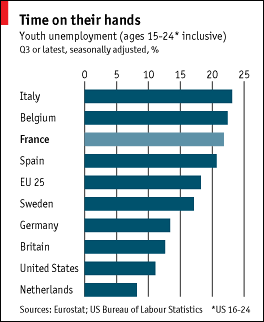The inevitable and the impossible
Tue. November 15, 2005Categories: Abstract Dynamics

‘It’s inevitable…. like globalization….’ Striking that the hapless Mark Corrigan should choose ‘globalization’ as an exemplar of the ‘inevitable’ at the moment he euphorically overcame impotence in the first episode of the latest series of Channel 4’s brilliant anti-Lad comedy, Peep Show. A symptom, no doubt, of the degree to which global capital and the notion of inevitability have become synonymous in the popular unconscious.
Capitalism’s appeal to inevitability is now so commonplace that it is a legitimate question as to whether the idea of inevitability is integral to the spread of global capital. ‘Inevitability’ operates as a kind of negativized hyperstitional motor for capital. If hypersition is about ‘fictions making themselves real’, then Capitalist Inevitability is about current reality maintaining itself in perpetuity. More of the same, forever. This alleged Inevitability is not a question of ‘Economic Laws’ – the hideous coupling of Hegel and Adam Smith in the neo-liberal climax of history – but of belief. The Inevitable figures as a belief that engenders behaviour in a self-fulfilling circuit. It is because people believe that capitalism is Inevitable that it is. For now.
It appears that former Green and Friends of the Earth activist ‘Sir’ Jonathan Porritt is now a reluctant advocate of the view that Capitalism is inevitable. As summarised by The Guardian, Porritt’s current position ‘is pragmatic and goes briefly like this: it is impossible to deny the need for profound change in the face of today’s ecological crises; the pace of change is not sufficient, and conventional environmentalism has failed to win over hearts and minds; change has to be desirable and will not come by threatening people with ecological doom; therefore, we must embrace capitalism as the only overarching system capable of both reconciling ecological sustainability, and reforming it. More to the point, he says, “we don’t have time to wait for any big-picture ideological successor”‘. ”Like it or not,’ Porritt writes, ‘capitalism is the only game in town. The drive to extend the reach of markets into every aspect of the economy is an irresistible force.’ What’s odd about Porritt’s argument is his (albeit mitigated) faith in capitalism, his conviction that it is in any way ‘realistic’ that capitalism will deliver ecological sustainability. What is particularly disappointing about his position is that it incorporates Green issues into Capitalist Realism rather than positing them as an aspect of the Real which Capital cannot metabolize.
Whilst intended to convey swaggering teleological certitude, the appeal to Inevitability also bespeaks a certain libidinal deficit in capital, for the silent clause in any claim about capitalism’s Inevitability is ‘you might not like it, but….’. In practice, of course, the Inevitable cashes out as the extirpation of politics and its replacement by administration, generalized managerialism and Reform. (This crock of shit is extremely difficult to sell convincingly, as Blair is now discovering.) The precise opposite of the Inevitable is the Impossible, which is why any genuine notion of the political must be based upon the Impossible, on what is unthinkable in the current arrangment of reality.
Perhaps the lineaments of this Impossible alternative are visible in what is happening in France, which is in part the obverse of the dominant Gleamprog narrative of globalization. Only those left behind by the ‘inexorable tide’ of the Inevitable will make the Impossible happen.

Interesting, and telling, that disenfranchised Muslims are held to be the Enemy by both the neo-liberal advocates of deterritorialized capital and their supposed adversaries in protectionist Old Europe. ‘Islamofascism’ easily trips off the tongues of neo-libs (essentially because the predicate ‘fascist’ is already contained within the subject ‘Islam’ as far as they are concerned), while IslamoMarxism is treated as a joke.
But – credit where credit’s due – in a welcome break from his standard idiocy, Aaronovitch today rejected the idea that the riots could be attributed to the religious background of those involved. (He also rightly exoriates the racist denunciations of ‘Eurabia’.) In this he is supported by none other than the Economist, which argued on Friday that the riots were an ‘underclass rebellion’ sparked by factors which were primarily economic, of which unemployment is the most significant (see its graph, above). ‘This was the angry rebellion of a beardless, Nike-wearing teenage underclass.’ (The Economist’s analysis is not as far away from that of Badiou’s l’Organisation politique as you might expect.) However, the economic, the ethnic and the religious are not easily separated, in part because being unemployed and being a muslim are much more closely correlated, in France as in Britain, than they ought to be. As the Economist points out, ‘according to a report last year by the Institut Montaigne, a think-tank, the unemployment rate of visible minorities [in France] is nearly three times the national average.’ But this means that a flip is always possible – and that many around the world who now identify themselves in terms of a religious affiliation could come to see themselves as part of a worldwide underclass … the ‘detritus of globalization’ as the seeds of a new revolutionary subjectivity?